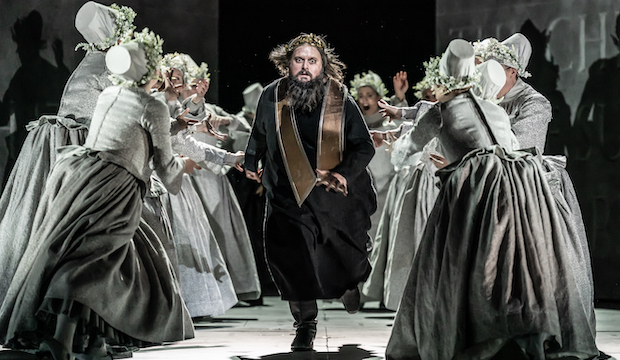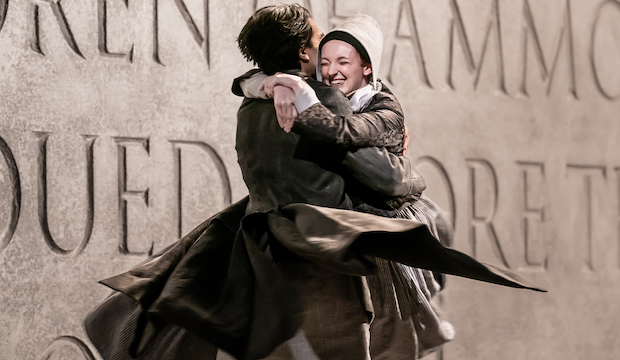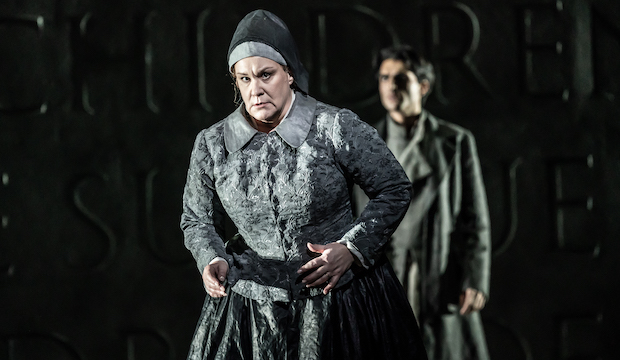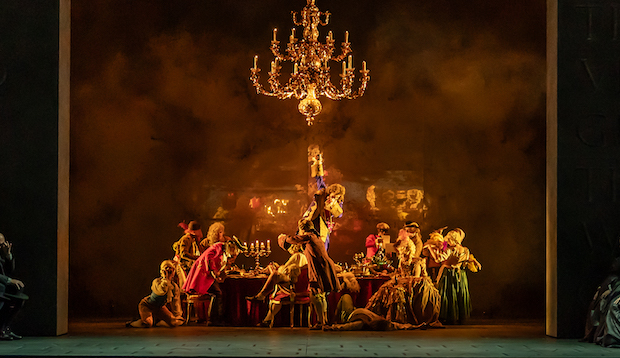Jephtha, Royal Opera House review ★★★★★
Jennifer France shines as a daughter lost to her father's dangerous pledge in a new staging of Handel's oratorio
Handel's Jephtha at the Royal Opera House. Photo: Marc Brenner
The words 'children' and 'slaughter' stand out from the tablets of stone that tower over warring peoples in a staging at the Royal Opera House of Handel's late oratorio Jephtha.
'Children' refers to all the people of one faction. 'Slaughter' means what it says. And while the always unstable Middle East's current bloodshed had not started when director Oliver Mears embarked on this production, life has a habit of keeping up with opera. 'Children' and 'slaughter' is like a new ground bass to this musical score.
While sensibly sidestepping any allusion to today's crisis, universal dilemmas about faith vs. family burn through. Jephtha has been brought in to lead an oppressed people, nominally the Israelites but here Amish-like puritans in grey plaid. Their fightback is against the Ammonites – Hogarthian degenerates, pawing each other in revels from which even the most dedicated party-goer will recoil.

Jephtha (Allan Clayton) is haunted by his dire promise. Photo: Marc Brenner
But in his desperation to win, Jephtha makes a pledge that in its own way is as repellent – to sacrifice the first creature he encounters upon his return home, in exchange for victory. He will not break his word, even when it is his own daughter Iphis who rushes to greet him.
We have seen too vividly how religious tensions destroy families, and at this point in the production family dynamics surge uppermost, propelled by the outstanding playing of the Orchestra of the Royal Opera House under early music expert Laurence Cummings.
Iphis, as ethereally sung by soprano Jennifer France, is believably in love with counter-tenor Cameron Shahbazi's likeable Hamor, their frustrated passion subject to their religion's codes. Distraught mother Storgè, sung with both love and anger by Alice Coote, sides with her child, and against her husband. But the sacrifical pyre is being built…

Cameron Shahbazi as Hamor and Jennifer France as Iphis. Photo: Marc Brenner
God is not as cruel as His followers: Jephtha has forgotten the ban on burnt offerings. He could instead dedicate his daughter to a life of religious observance – and virginity. Here France's serene Iphis behaves with the humanity with which this curious piece is infused by Mears. While prepared to go to her death, she is not prepared to accept a fate worse than death – a long, lonely life parted from the man with whom she would have had children of her own.
A truly wonderful performance by France is the lasting gift of this production. Constantly dressed and redressed for each new role she must play in the unfolding drama, she imbues the single word 'adorn' with a whole wardrobe of colour.
Coote too can push the physical tremble of rage into her voice. Shahbazi's Hamor is deranged by PTSD, having loyally joined the fight and taken part in a massacre. A boy soprano, Ivo Clark on first night, sings an intervening angel who appears to have been ready to step in along, ever-present in the shape of Iphis's ever-watchful brother.

Alice Coote as furious Storgè. Photo: Marc Brenner
You could almost pity Jephtha. But you don't, not Allan Clayton's bullish Jephtha, at any rate, although the character can be portrayed as less belligerently well-meaning and misguided. Even the usually heart-breaking 'Waft her angels, through the skies' goes for nothing. Will his people stick with a flawed leader through this turmoil undertaken for their sake, or turn on a man who has gone too far…?
It is those people who are problematic. While we believe in the generations of Jephtha's household, the religious fanatics seem to live in a vacuum where life is solely about waving religious texts. This caricature of religion, in common with the protagonists in the Middle East, ignores faith as a code for living.
Handel, a devout Christian, worshipped at St George's, Hanover Square, near his home in Brook Street, Mayfair. With his Messiah he raised thousands for Thomas Coram's new Foundling Hospital (founders included William Hogarth), putting his faith into action. He would not recognise this grim chorus as the sole face of belief.

The Ammonite's Hogarthian revels. Photo: Marc Brenner
Simon Lima Holdsworth's set is similarly severe, only enriched by Fabiana Piccioli's penetratingly intelligent lighting. Movement by Anna Morrissey tends towards arm-raising, finger-wagging and writhing. Handel's oratorio chorus was not designed to partake in the action, but to be commentators on the side. They don't fit comfortably into the drama, and whereas we recognise Jephtha's flesh-and-blood family, this grey army is unreal. They have no occupations, no personalities – and no children.
Jephtha is sung in English with English surtitles. Further performances are on Friday 10, Sunday 12, Tuesday 14, Tuesday 21 and Friday 24 November. Click here for booking.
'Children' refers to all the people of one faction. 'Slaughter' means what it says. And while the always unstable Middle East's current bloodshed had not started when director Oliver Mears embarked on this production, life has a habit of keeping up with opera. 'Children' and 'slaughter' is like a new ground bass to this musical score.
While sensibly sidestepping any allusion to today's crisis, universal dilemmas about faith vs. family burn through. Jephtha has been brought in to lead an oppressed people, nominally the Israelites but here Amish-like puritans in grey plaid. Their fightback is against the Ammonites – Hogarthian degenerates, pawing each other in revels from which even the most dedicated party-goer will recoil.

Jephtha (Allan Clayton) is haunted by his dire promise. Photo: Marc Brenner
But in his desperation to win, Jephtha makes a pledge that in its own way is as repellent – to sacrifice the first creature he encounters upon his return home, in exchange for victory. He will not break his word, even when it is his own daughter Iphis who rushes to greet him.
We have seen too vividly how religious tensions destroy families, and at this point in the production family dynamics surge uppermost, propelled by the outstanding playing of the Orchestra of the Royal Opera House under early music expert Laurence Cummings.
Iphis, as ethereally sung by soprano Jennifer France, is believably in love with counter-tenor Cameron Shahbazi's likeable Hamor, their frustrated passion subject to their religion's codes. Distraught mother Storgè, sung with both love and anger by Alice Coote, sides with her child, and against her husband. But the sacrifical pyre is being built…

Cameron Shahbazi as Hamor and Jennifer France as Iphis. Photo: Marc Brenner
God is not as cruel as His followers: Jephtha has forgotten the ban on burnt offerings. He could instead dedicate his daughter to a life of religious observance – and virginity. Here France's serene Iphis behaves with the humanity with which this curious piece is infused by Mears. While prepared to go to her death, she is not prepared to accept a fate worse than death – a long, lonely life parted from the man with whom she would have had children of her own.
A truly wonderful performance by France is the lasting gift of this production. Constantly dressed and redressed for each new role she must play in the unfolding drama, she imbues the single word 'adorn' with a whole wardrobe of colour.
Coote too can push the physical tremble of rage into her voice. Shahbazi's Hamor is deranged by PTSD, having loyally joined the fight and taken part in a massacre. A boy soprano, Ivo Clark on first night, sings an intervening angel who appears to have been ready to step in along, ever-present in the shape of Iphis's ever-watchful brother.

Alice Coote as furious Storgè. Photo: Marc Brenner
You could almost pity Jephtha. But you don't, not Allan Clayton's bullish Jephtha, at any rate, although the character can be portrayed as less belligerently well-meaning and misguided. Even the usually heart-breaking 'Waft her angels, through the skies' goes for nothing. Will his people stick with a flawed leader through this turmoil undertaken for their sake, or turn on a man who has gone too far…?
It is those people who are problematic. While we believe in the generations of Jephtha's household, the religious fanatics seem to live in a vacuum where life is solely about waving religious texts. This caricature of religion, in common with the protagonists in the Middle East, ignores faith as a code for living.
Handel, a devout Christian, worshipped at St George's, Hanover Square, near his home in Brook Street, Mayfair. With his Messiah he raised thousands for Thomas Coram's new Foundling Hospital (founders included William Hogarth), putting his faith into action. He would not recognise this grim chorus as the sole face of belief.

The Ammonite's Hogarthian revels. Photo: Marc Brenner
Simon Lima Holdsworth's set is similarly severe, only enriched by Fabiana Piccioli's penetratingly intelligent lighting. Movement by Anna Morrissey tends towards arm-raising, finger-wagging and writhing. Handel's oratorio chorus was not designed to partake in the action, but to be commentators on the side. They don't fit comfortably into the drama, and whereas we recognise Jephtha's flesh-and-blood family, this grey army is unreal. They have no occupations, no personalities – and no children.
Jephtha is sung in English with English surtitles. Further performances are on Friday 10, Sunday 12, Tuesday 14, Tuesday 21 and Friday 24 November. Click here for booking.
TRY CULTURE WHISPER
Receive free tickets & insider tips to unlock the best of London — direct to your inbox
| What | Jephtha, Royal Opera House review |
| Where | Royal Opera House, Bow Street, Covent Garden, London, WC2E 9DD | MAP |
| Nearest tube | Covent Garden (underground) |
| When |
08 Nov 23 – 24 Nov 23, Six performances, start times vary. Running time 3hr including one interval |
| Price | £9-£200 |
| Website | Click here for details and booking |